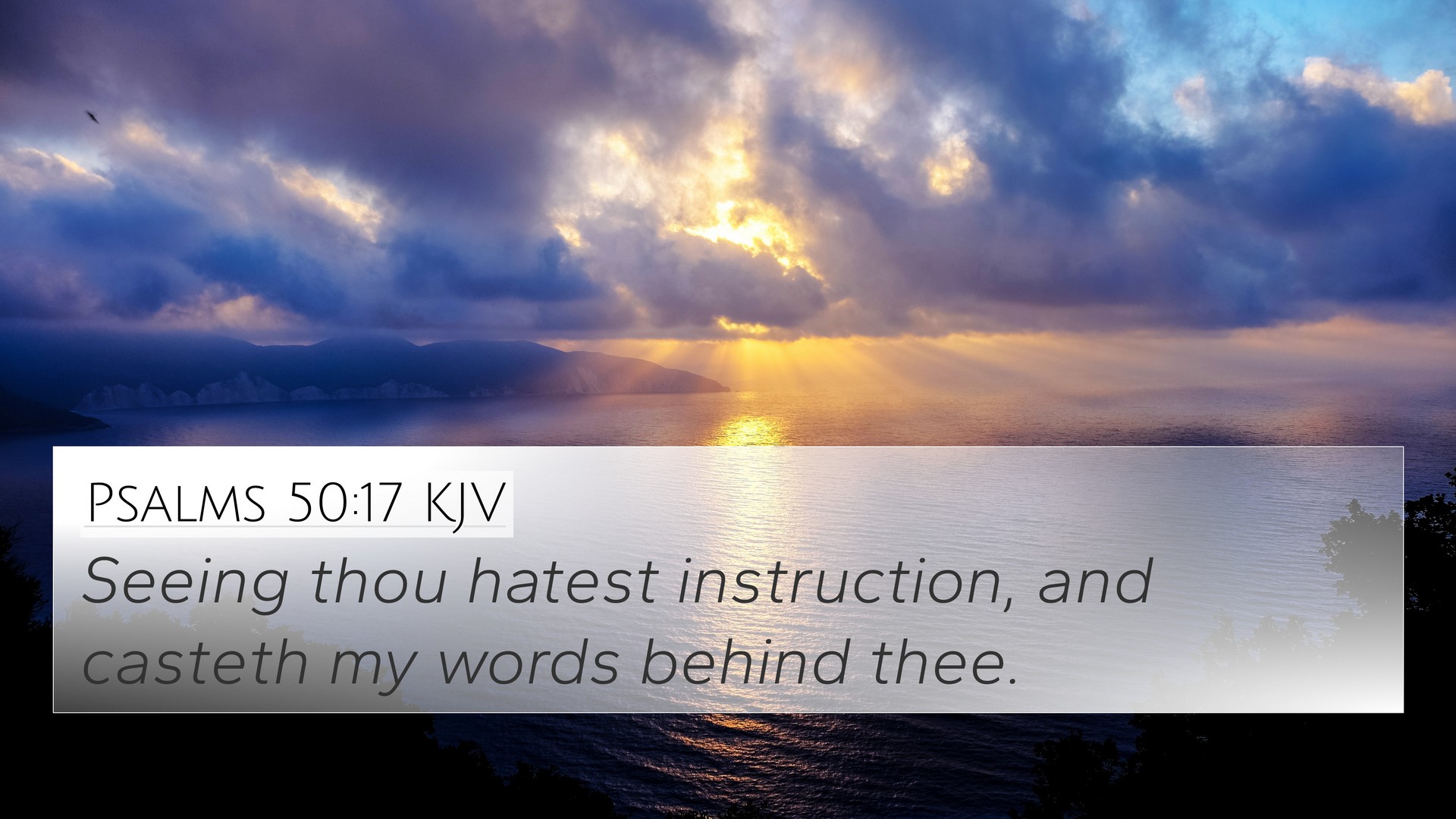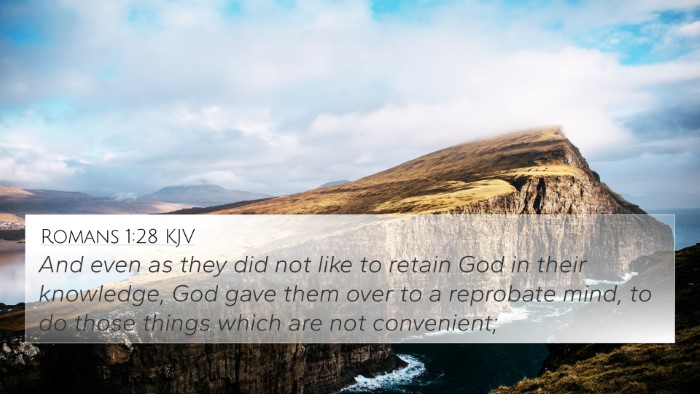Understanding Psalms 50:17
The verse Psalms 50:17 states: "For you hate discipline, and you cast my words behind you." This profound statement invites deep reflection on the nature of human behavior and our response to divine instruction. Below is a summary of its meaning derived from several public domain commentaries, integrating insights from Matthew Henry, Albert Barnes, and Adam Clarke.
Key Themes and Meanings
Psalms 50:17 addresses themes of obedience, rejection of God's word, and the seriousness of discipline in the life of believers. The verse highlights the consequences of disdain for God's instructions.
Reflection on Discipline
Matthew Henry notes that the hatred of discipline is often rooted in pride and self-sufficiency. Individuals who reject discipline fail to see its importance for spiritual growth and moral correction. Henry emphasizes that this rejection is not merely a personal affront but a dismissal of God's authority.
The Consequences of Rejection
Albert Barnes expands on this by pointing out that casting God’s words behind signifies a willful act of ignoring divine counsel. This act reflects a deeper spiritual malaise—where individuals choose their desires over God’s teachings. Barnes suggests that such a decision leads to spiritual decay, as one removes themselves from God’s protective guidance.
The Importance of God’s Word
Adam Clarke interprets the phrase “cast my words behind you” as a metaphor for neglect. He highlights that God's words are meant for our benefit and rejecting them ultimately leads to disfavor. Clarke underscores the idea that loving and valuing God’s instructions pave the way to a fruitful life.
Bible Verse Cross-References
Understanding Psalms 50:17 can be enriched by exploring related verses that emphasize the importance of discipline and obedience. Here are 10 key cross-references:
- Proverbs 3:11-12: "My son, do not despise the Lord's discipline, and do not resent his rebuke, because the Lord disciplines those he loves, as a father the son he delights in."
- Hebrews 12:5-6: "And have you completely forgotten this word of encouragement that addresses you as a father addresses his son? It says, 'My son, do not make light of the Lord's discipline, and do not lose heart when he rebukes you, because the Lord disciplines those he loves, and he chastens everyone he accepts as his son.'
- Isaiah 30:10: "They say to the seers, ‘See no more visions!’ and to the prophets, ‘Give us no more visions of what is right! Tell us pleasant things, prophesy illusions.'
- Jeremiah 5:3: "O Lord, do not your eyes look for truth? You strike them, but they feel no pain; you crush them, but they refuse correction. They made their faces harder than stone and refused to repent."
- Revelation 3:19: "Those whom I love I rebuke and discipline. So be earnest and repent."
- Luke 11:28: "He replied, ‘Blessed rather are those who hear the word of God and obey it.’"
- James 1:22: "Do not merely listen to the word, and so deceive yourselves. Do what it says."
- Proverbs 12:1: "Whoever loves discipline loves knowledge, but whoever hates correction is stupid."
- Matthew 7:24-27: "Therefore everyone who hears these words of mine and puts them into practice is like a wise man who built his house on the rock."
- Romans 10:16: "But not all the Israelites accepted the good news. For Isaiah says, ‘Lord, who has believed our message?’"
Connections Between Bible Verses
Each of these references showcases the holistic nature of God's communication with His people about the dynamics of loving correction and the importance of heeding His Word. By connecting Psalms 50:17 with these verses, we see a thematic thread that emphasizes discipline and obedience as crucial elements of a faithful life.
Practical Application and Cross-Referencing Tools
For those looking to deepen their understanding, tools for Bible cross-referencing can be invaluable. Using a Bible concordance can help illuminate connections across scriptures. A Bible cross-reference guide assists in identifying thematic links and contrasts across the canon.
How to Use Bible Cross-References
By utilizing a Bible cross-reference system, one can uncover rich inter-Biblical dialogue. For instance, examining how the New Testament writers used the Psalms reveals the continuity of God's message through various eras of Scripture.
Conclusion
Psalms 50:17 implores believers to reflect on their relationship with God's words and the importance of discipline in the journey of faith. By understanding this verse in conjunction with related scriptures, one can grasp the broader biblical narrative regarding obedience, correction, and personal growth.
As you continue your cross-reference Bible study, remember that each verse is a thread woven into the rich tapestry of God's word, calling us to live in accordance with His will.


















